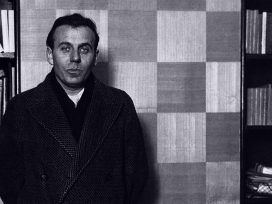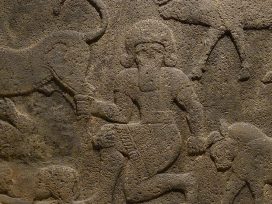Following the Second World War, the writer Louis-Ferdinand Céline’s reputation was in shreds. Once feted for having revolutionised French prose, Céline was now known primarily as a woebegone crank whose antisemitism was of an unparalleled virulence. Fearing retribution for his collaboration with the Nazi occupiers during the war, he had fled to Denmark during the épuration sauvage: the spree of summary executions that followed the Liberation. He was detained by the Danish government, but it complied with his wish not to be extradited back to France, where he might have faced a similar fate to fellow collaborator, Robert Brasillach – the only writer to have been executed at this time for treason by the French state. Exile in Denmark provided Céline sanctuary while France purged itself of its most despised traitors and enemies in a cathartic orgy of violence. Eventually convicted in absentia and fined a relatively small sum, he was in addition declared a national disgrace. Having avoided the severest of sanctions, his proscription was thereby given state imprimatur.
Céline fiercely contested the charges levelled against him. Absurdly, he saw himself as part of an illustrious lineage of enfants terribles, provocateurs and poètes maudits unjustly persecuted for their convictions, a tradition that stretched from the bawdy late medieval poet François Villon to Victor Hugo, author of Les misérables and avuncular emblem of French Republicanism. Yet even if he denied these charges, in particular that of Sartre, who suspected Céline had been paid by the Nazis in exchange for lending his polemical talents to the cause of antisemitism, explicit retractions or mea culpas there were none. Granted an amnesty in 1951 amid curious circumstances – his lawyer, Jean-Louis Tixier-Vignancour, had cunningly used Céline’s real name, Destouches, in his court filings, and so the presiding judge failed to make any connection between a Destouches and the notorious pamphleteer and antisemite – Céline retreated to the Parisian suburb of Meudon with his wife Lucette, where he spent the last years of his life furiously documenting his travails and venting spleen at his myriad enemies, real and imagined. Especially telling is that Céline took umbrage less with the substance of Sartre’s (and others’) portrait of him, and more with the assertion that a quid pro quo had in all probability taken place; this would have left him liable to prosecution for treason like Brasillach. Indeed, Céline seemed all in all oddly disinclined to even bother trying to disabuse others of his infamy.
While prevaricating around the specificities of his antisemitism and what might have motivated it – he without doubt harboured violently antisemitic views till his death – Céline would gleefully refer to himself as ‘the monster of Montmartre’, ‘the biggest shit alive’, a ‘centrifugation of hate’. This choreographing of a very distinct public persona, in which he embraced his own notoriety, was again starkly expressed in a series of valedictory interviews Céline granted journalists in the years leading up to his death in 1961. In these he vituperated with abandon and even at one point burst into song. He claimed that he wrote only in order to make a living, thus lending credence to Sartre’s claim that he was ultimately motivated by venality. He also declared that the only thing that would be likely to bring him happiness was his own death. No attempt was made either to propitiate his many detractors or to expiate his past transgressions. Indeed, he seemed precisely the kind of swivel-eyed loon who might have penned a screed like Bagatelles pour un massacre (Trifles for a massacre) (1938), the first of his splenetic antisemitic pamphlets. All of this had an element of undeniable comedy, if only in how it skewered expectation. While the embittered Céline clearly believed his own story – that he was an unimpeachable patriot French outrageously traduced – he knew his wider audience would not, and so he had decided ‘to give them their money’s worth’, in his wife Lucette’s words.
This is hardly what Gaston Gallimard, Céline’s publisher, had in mind. According to Céline, Gallimard had urged him to go on radio and TV and ‘play the game’: sell himself, hype up what delights awaited the reader; maybe even apologise. Yet if Céline had agreed to ‘play the game’, he had elected to play by different rules. As in other works of the postwar period, his strategy was to appeal by appalling: he would weaponise his pariah status. The consummate pessimist, Céline knew himself that he was utterly beyond redemption. Besides, since the publication of his insurgent first novel, Voyage au bout de la nuit (Voyage to the end of the night) (1932), readers had flocked to him for neither comfort nor comity. His appeal had always been of a wholly different nature: the thrill of taboo, the frisson of antagonism. Many readers simply desired the company of a renegade or to scratch a contrarian itch. As Henri Godard, France’s most esteemed Céline scholar put it, ‘he turns upside down what authors of every epoch have done when they seek to reconcile the reader to him, to make him a friend. Céline treats the reader as an adversary, and vice versa … hostility will do just as well as complicity.’

Louis-Ferdinand Céline.
Photo via Agence de presse Meurisse from Wikimedia Commons
Attuned like few others to the darker recesses of the human psyche, he had realised quite early in his career as a writer that he could leverage his own lurid attraction and establish a logic that might later redound to his benefit. In effect, if this was already priced in to his appeal, then his reputation could absorb – and even profit from – condemnation, no matter how accurate or incisive; pointing to his enormities would merely fortify the ‘legend’ of this ‘delirious traitor’ to which so many were drawn, for better or for worse. Céline had thus orchestrated a marketing strategy that was for him a win-win, and for his detractors a trap: reiterating how deplorable he was would merely add garish gloss to his bad-boy reputation and elicit yet more morbid curiosity.
This perverse logic was demonstrated during the 2011 polemic around his inclusion in the French Ministry of Culture’s list of ‘célébrations nationales’. It had been decided that Céline would be included in the catalogue, along with a variety of other French writers and cultural icons, to mark the fiftieth anniversary of his death. Shortly after the announcement, a number of figures, most notably Serge Klarsfeld, the president of the Association of the Sons and Daughters of Jewish Deportees from France (Association des fils et filles des déportés juifs de France), adamantly objected, and demanded Céline’s immediate removal. Henri Godard and those who had agitated for his inclusion argued, for their parts, that the ‘célébrations nationales’ were not in fact intended hagiographically. Rather, they were for the purposes of commemoration; whether one liked it or not, Céline was clearly a part of France’s literary patrimony. Yet the term ‘célébrations nationales’, as Klarsfeld pointed out, suggested otherwise. Frédéric Mitterand, the minister of culture and communication under the government of Nicolas Sarkozy, in turn agreed that the inclusion of Céline had been profoundly ill-judged. He was duly removed from the list.
Yet irrespective of the merits of the arguments on either side, Céline was again front-page news. Writers and intellectuals sparred over what, precisely, the ritual of commemoration was about, and what purpose it was ultimately meant to fulfil. They held forth over whether literature and literary figures could be discussed from a position of neutrality. They argued over whether neutrality of perspective was even a goal worth pursuing or merely a dubious assumption. They clashed, of course, over freedom of speech and censorship. What had begun as an attempt to triage Céline into an obscurity where many felt he truly belonged had instead dragged him back into the limelight.
The same occurred a few years later when Gallimard, the most venerable of France’s literary gatekeepers, floated the idea of publishing his antisemitic pamphlets under the disturbingly euphemistic title Écrits polémiques (polemical writings). Again, a chorus of resolute opposition mobilised behind Klarsfeld, who pointed out that not only did these pamphlets’ superlative hatefulness make them unworthy of Gallimard’s endorsement but that, in addition, the contemporary context in France, which had experienced a frightening rise in antisemitic violence, risked being dangerously receptive to Céline’s racist invective. Again though, however righteous these attempts at reminding readers and the public that literature was never just literature – or ‘style’, as Céline liked to remind us – they had, albeit unwittingly, amplified his media presence. The flame of infamy burns bright.
Louis-Ferdinand Destouches – he would later adopt the nom de plume Céline after his maternal grandmother – was born in the Parisian suburb of Courbevoie in May 1894. Shortly after, his parents, firmly petit bourgeois (his father worked at an insurance firm while his mother owned a small boutique selling lace) moved to the Passage choiseul in Paris’s more central 2nd arrondissement, where the young Destouches spent a rather typical, and for the most part happy, childhood. Unsurprisingly, he would later darken and distort, largely for comedic effect, his accounts of his upbringing. In particular, he portrayed his father in his second novel, Mort à Crédit (Death on credit) (1936), as a cartoonish patriarch who inspired absolute terror in his hapless, misfit soon. One aspect of Céline’s portrait of his father, though, was ominously true: he was viciously antisemitic in a way that was far from unusual in a man of his social status in France in this period. The novel’s narrator, ostensibly a surrogate for the young Céline, even mocked and satirised the absurdity of his father’s antisemitic tirades.
Most formative for the young Céline, however, was his traumatic experience in the trenches during the First World War. He had enlisted in the 12th Cuirassier Regiment in an act of rebellion against his parents, and was promoted to the rank of sous-officier – the equivalent of a non-commissioned officer – shortly after his twentieth birthday. He soon saw action and was badly wounded during a skirmish with German forces, having volunteered to carry a message to an ancillary regiment. He was discharged and awarded both the prestigious médaille militaire and croix de guerre. Later, he would claim that he had undergone trepanation during treatment for a head wound. He was adamant that this injury, moreover, along with the subsequent botched treatment, was responsible for the maddening continuo of tinnitus and other auditory hallucinations which accompanied him for the rest of his life. However, evidence of any trepanation is lacking. If anything, this was an early indication of Céline’s knack for self-mythologising; as scrupulous a historian as Robert Soucy, author of renowned works on fascism in France, reaffirmed this fabrication in his 1974 article, ‘French Fascist Intellectuals in the 1930s: An Old New Left?’ Having recovered, and following a brief stint in London, Céline ventured further afield, travelling to Cameroon on behalf of a French forestry company: the beginnings of what would be a peripatetic life. He shortly after returned to France, where he trained to become a doctor before embarking on yet more travels, this time under the auspices of the newly founded League of Nations. This took him to Switzerland, and then across the Atlantic to Canada and the United States.
These experiences constituted the raw materials for his seismic debut novel, Voyage au bout de la nuit (Voyage to the end of the night). The horror and absurdity of war is articulated with an unmatched, and darkly comic, acuity. The anomie and alienation of working-class existence in Detroit and later suburban Paris is conveyed in its unrelenting drudgery. Humanity’s internecine hatreds are dispiritingly, but somehow convincingly, portrayed as insatiable, along with our dire metaphysical predicament – the fact that ‘the truth is death’, as Bardamu, the novel’s narrator, memorably puts it. Céline even gives the impression of disapproving of French colonial savagery, exposing its hypocrisy and dehumanising impetus. Most shocking to readers, however, was less the novel’s content and more its form: refusing to kowtow to literary decorum, Céline embroidered every page with the musical rhythms and inflections of Parisian demotic. He called this his ‘petite musique’.
The novel was universally acclaimed for having both transformed French literary prose and for having posed a challenge to the institution of literature itself, which Céline denounced as hopelessly sclerotic. Henceforth literature need not only be represented by the stately meanderings of a Proust or a Gide; just as affecting, and more revolutionary, was the populist poetry of a Céline. Nevertheless, the gatekeepers, this time in the shape of the judges of the Prix Goncourt, were disinclined to take any risks: he was denied the prize in 1932, which was instead awarded to Guy Mazeline’s now largely forgotten novel Les Loups (the wolves). Critics had pointed to Céline’s profligate obscenity as disqualifying, as well as his disconcerting, unrelenting misanthropy. For now, his hatred, the expression of which he would later write was dependent on his brand of slang – a language ‘born of hatred’, he wrote – was an indiscriminate salvo from which nobody, himself included, appeared immune. There was little to augur, indeed, at whom precisely this would soon be directed.
Céline’s next offering, Mort à Crédit, failed to impress. Even to those who had championed him, it seemed hackneyed compared with the genuine tripwire-shock of Journey. One could sense resentment and anger building on Céline’s part. Another setback after the Goncourt debacle, he was now a tinder box of fury in search of a scapegoat. Shortly before the outbreak of war in 1939, he unleashed Bagatelles, his first antisemitic pamphlet. Its style – scabrous in the extreme, self-contradictory, hyperbolic to the point of absurdity – was recognisable within the context of French antisemitic writing. Precursors included Léon Bloy, renowned essayist and vociferator, and more ominously Édouard Drumont, antisemitic ranter, conspiracist-in-chief, and editor of the journal La Libre Parole. Yet Céline’s invective went beyond anything seen before; in extremity, the hinterland of grifters around him seemed positively lily-livered. Indeed, Bagatelles and what would follow seemed so unhinged that many of his allies came to view Céline as a liability. For them, he was at heart an anarchist, his delirious ravings wholly inimical to the order that would be demanded by fascist autocracy.
Literary critics were even more bewildered. The novelist André Gide, for instance, speculated that Céline was either joking or had simply gone mad. This insouciance was both telling and troubling, for it gestured to what might be for Céline an alibi: his opponents could be dismissed as simply incapable of taking a joke or as ‘not getting it’, while those who sympathised with him got the message loud and clear. Humour of a particularly extreme variety, Céline realised, could be weaponised in order to both wrongfoot those hostile to him and his message, and to indemnify himself. No wonder his pamphlets career along in hairpin turns of perspective: one moment he is rehashing the tritest of antisemitic tropes; another he seems to be earnestly ventriloquising his opponents’ cogent rebuttals. The texts are rife with puerile puns – Léon Blum, leader of the prewar Popular Front and reviled by antisemites like Céline, is referred to, for example, by the homophobic epithet ‘Bite-Blum’ (cock-Blum) – and outlandish conspiracy theories: Montaigne, Racine, Stendhal, Cézanne, Zola, Proust and the pope are all part of a transhistorical Jewish plot responsible for France’s ills, from the Reformation to the French Revolution. The author of Voyage au bout de la nuit could not, surely, believe any of this nonsense?
Whether he did or not, the German thinker Walter Benjamin wrote to his friend and fellow antifascist Max Horkheimer in an exchange over Gide’s reaction to Bagatelles, mattered for little. For Benjamin, what we ought to focus on as critics are not Céline’s intentions, but rather the consequences of what he said and wrote. In any case, Céline had made sure his intentions remained opaque, shrouded as they are in a haze of indeterminacy. Moreover, Benjamin had already noted in his writings on the poet Baudelaire how humour, especially what he called a specific kind of ‘satanic laughter’, could be useful to those with far from noble intentions. This was the sadistic laughter of power, not the emancipatory mirth of a Swift; it was the laughter of humour that punches down, not up. Of course, Benjamin had shown himself to be acutely aware of how politics and aesthetics relate: he had famously remarked on how fascism desires to aestheticise politics and vice versa. After the war, Céline would risibly claim that he was primarily a literary ‘stylist’ in whose work any discernible ‘message’ was secondary, if not entirely irrelevant. However, as Benjamin was at pains to point out, style and a particular aesthetic were indispensable to fascist and Nazi propaganda, which Céline’s works evidently partook in. As such, Céline’s defence from style was in fact no defence at all.
Yet even more revealing was a remark in his postwar novel, D’un château l’autre (Castle to castle) (1957), for which the interviews detailed earlier served as quasi-marketing exercises: ‘once you’re recognised to be a clown, you can say anything!’ In his ‘Portrait of an Antisemite’, for which Céline was quite clearly the odious muse, Jean-Paul Sartre noted how the antisemite, in order to gain the upper hand, would traffic in frivolity and loucheness, knowing full well that their interlocutors would feel bound to basic rhetorical decency; ‘they delight in acting in bad faith,’ he wrote, ‘since they seek not to persuade by sound argument but to intimidate and disconcert.’ In this, Céline was expert. No wonder his pamphlets, as well as his later postwar works, are aswarm with self-evident absurdity and equivocation. Amid such confusion, plausible deniability would always be at the ready, for the boundary between sincerity and play-acting was rendered virtually imperceptible. By an act of supreme cynicism, Céline reasoned, one could cover all bases.
Céline resembles what we would today call a troll. First, he was contemptuous of the truth and its validity; ‘truth is no longer of the age’, he wrote to his friend Joseph Garcin as early as 1932. Second, he delighted in pseudonymity and the rhetorical houseroom it afforded him; ‘Céline’ was merely a role, he was in fact the humble doctor Destouches. Third, he was indefatigable in his willingness to say the unsayable, even if for the sole purpose of gratuitously inflicting pain. Fourth, he tended to couch his hate with meta-ironic, self-deprecatory humour; ‘rest assured, I’m lampooning my own absurdities and excesses too!’ Finally and most disturbingly, he was of the fringe and yet the ideology with which he is identified had acquired real political power. Accordingly, it is perhaps unsurprising that Sartre’s ‘Portrait of an Antisemite’ is doing the rounds for its striking prescience in articulating a thoroughly contemporary predicament: how do we tackle not only the noxious ideology that such figures espouse, but the rhetorical mode through which this ideology is given voice? How does one censure those whose status is premised on the very opprobrium we would seek to attribute to them?
Andrew Marantz of The New Yorker, in his forthcoming book Antisocial: Online Extremists, Techno-Utopians, and the Hijacking of the American Conversation, articulates the problem, at least as it pertains to the contemporary United States, thus:
Trolls may be puerile, but they set an ingenious trap. By responding to their provocations, you risk amplifying their message. By ignoring them, you risk seeming complacent or complicit. The opposite of misinformation is correction, but corrections, for the most part, don’t change people’s minds. The opposite of normalisation is outrage, but trolls use outrage as fuel. Trolls act in indescribably awful ways and dare reporters to describe their actions dispassionately. But for reporters on the lurid ugliness beat, it’s often impossible to be evenhanded and truthful at the same time.
Céline offers an early example both of tactics that have become all too familiar, especially online, and a cautionary tale about how we might approach figures who seem intent on monopolising attention at whatever cost. He also presents a particularly vexed case for considering the uses, admirable and nefarious, to which humour can be put. It is no wonder, for that matter, that Céline’s critics have tended to be divided along such lines. On one side, those who celebrate his transgressive trailblazing and unique literary style argue that the black humour is somehow ultimately redemptive. On the other, there are those for whom there is little or nothing that we might deem humorous in Céline’s works at all, even those, such as Voyage, which are untainted by his antisemitism. The former perhaps fail to see that humour is not, in and of itself, salutary, while the latter are apt to forget that even those with despicable views can, from time to time, be funny.
We must remember, of course, that the average troll lacks the literary talents with which a Céline was manifestly endowed. It is precisely this that makes his case so intriguing and, perhaps, intractable. He managed, somehow, to become both infréquentable (untouchable in a negative sense) and incontournable (unmissable). To borrow a phrase from Marantz, he remains, whether we like it or not, simply ‘too big to ignore’.









